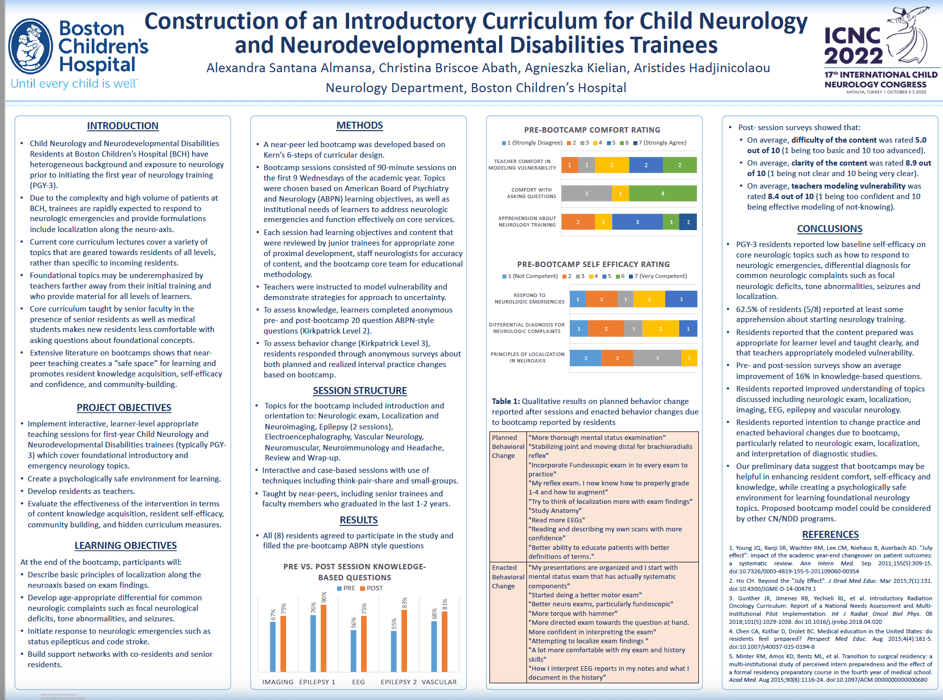Construction of an introductory curriculum for new child neurology and neurodevelopmental disabilities trainees
Alexandra Santana Almansa, Christina Briscoe Abath, Agnieszka Kielian, Aristides Hadjinicolaou
OBJECTIVE: Incoming child neurology and neurodevelopmental disabilities residents at Boston Children’s Hospital have disparate prior exposure to neurology. At this quaternary center’s neurology service, trainees are rapidly expected to respond to neurologic emergencies and provide diagnostic formulations.
METHODS: Based on Kern’s 6-steps of curricular design and the ABPN learning objectives, a near-peer led bootcamp was developed, focusing on basic principles of localization, common examination findings, approach to common neurologic complaints and emergencies.
RESULTS: All 6 residents (100%) responded to the survey after 6 sessions of participation. All participants had attended all sessions with the exception of having active patient care responsibilities or being on vacation. 100% reported significantly improved knowledge. All 6 reported increased comfort with asking clarifying questions and 67% reported benefit from case-based format with spaced repetition. Report of comfort level in taking care of patients with neurologic complaints as a result of sessions was highly varied. Three residents (50%) reported qualitative changes in behavior.
CONCLUSION: Preliminary results demonstrate high levels of engagement in interactive, level-appropriate teaching curriculum aimed to optimize learner experience and patient safety surrounding this critical transitional period.
Keywords: Education, Resident training, Near-peer teaching
Alexandra Santana Almansa
Boston Children's Hospital
United States
Christina Briscoe Abath
Boston Children's Hospital
United States
Agnieszka Kielian
Boston Childrens Hospital
United States
Aristides Hadjinicolaou
Boston Childrens Hospital
United States
OBJECTIVE: Incoming child neurology and neurodevelopmental disabilities residents at Boston Children’s Hospital have disparate prior exposure to neurology. At this quaternary center’s neurology service, trainees are rapidly expected to respond to neurologic emergencies and provide diagnostic formulations.
METHODS: Based on Kern’s 6-steps of curricular design and the ABPN learning objectives, a near-peer led bootcamp was developed, focusing on basic principles of localization, common examination findings, approach to common neurologic complaints and emergencies.
RESULTS: All 6 residents (100%) responded to the survey after 6 sessions of participation. All participants had attended all sessions with the exception of having active patient care responsibilities or being on vacation. 100% reported significantly improved knowledge. All 6 reported increased comfort with asking clarifying questions and 67% reported benefit from case-based format with spaced repetition. Report of comfort level in taking care of patients with neurologic complaints as a result of sessions was highly varied. Three residents (50%) reported qualitative changes in behavior.
CONCLUSION: Preliminary results demonstrate high levels of engagement in interactive, level-appropriate teaching curriculum aimed to optimize learner experience and patient safety surrounding this critical transitional period.
Keywords: Education, Resident training, Near-peer teaching
Alexandra Santana Almansa
Boston Children's Hospital
United States
Christina Briscoe Abath
Boston Children's Hospital
United States
Agnieszka Kielian
Boston Childrens Hospital
United States
Aristides Hadjinicolaou
Boston Childrens Hospital
United States

Alexandra Santana Almansa
Boston Children's Hospital
United States
Boston Children's Hospital
United States